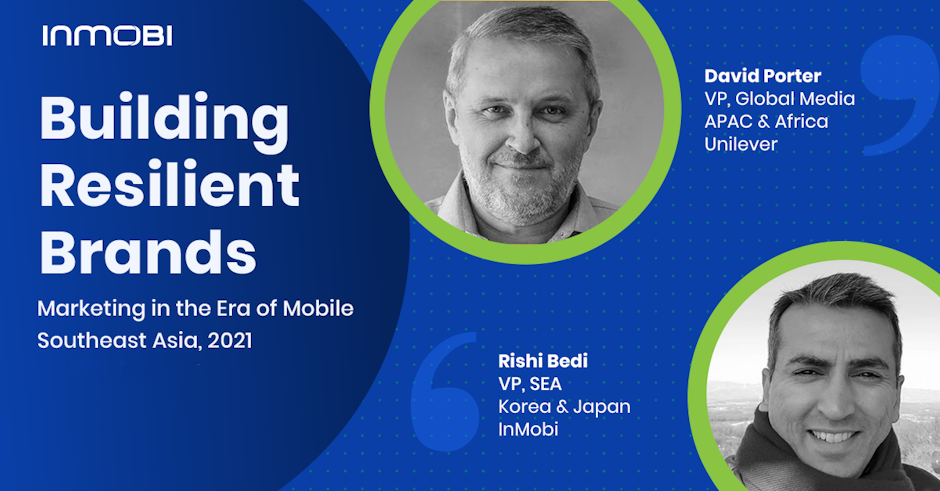Insights with InMobi: candid conversations with Asia’s marketing leaders - David Porter, Unilever
With market disruption dramatically shifting long conditioned behaviour in just a matter of weeks, digital has become the default choice in the way consumers choose to interact with the world

In our first article in our Insights with InMobi series, we present to you an excerpt from a conversation between David Porter, VP, Global Media, APAC and Africa at Unilever, and Rishi Bedi, VP, and GM, Southeast Asia, Japan & Korea, InMobi. They discuss how brands can keep up with changing consumer trends, gear up for a mobile-first world, and adapt to this new and evolving reality. You can watch the entire discussion below:
Rishi: Consumer behavior has shifted rapidly in the last few months and has led to a lot of uncertainty. Marketers have had to re-strategize their plans in the last year. What are some new normal consumer trends that are here to stay?
David: We’ve seen a massive acceleration in people’s behavior and also with brands and their digital marketing efforts. The things that we thought would take us four to five years have happened in a matter of months. Some of these habits get very interesting if we look at the extent to which e-commerce, e-medicine, and e-learning have really come into play. A lot of these habits are likely to stay with us, even after the pandemic.
The other thing that has changed is the public’s appetite for the kind of messages that brands are putting out. The need to be utterly authentic, especially in difficult times, is greatly magnified compared to how it was a few years ago.
Rishi: We also know that around 20% of digital consumers connected with a service for the first time during the pandemic. This is the first time the adoption of mobile and online services has shot up this high. From the government to OTT, e-commerce, and Edutech apps, all players across industries are gunning to connect with consumers via mobile apps. What should be a brand’s future strategy to connect with consumers on mobile and how important it is to do so today?
David: I think a few years ago, a lot of brands felt that the way to deal with this growing space was to build their own app. I think it is not about necessarily having your own app, it is about navigating the app-based world. Apps have emerged as an important space for brands to play in. I see programmatic as the only way we can make this less labor-intensive, affordable, and accountable. I am looking forward to doing more work in this space.
Rishi: So how do brands who do not own an app today straddle this development?
David: Having a stronger online presence got a whole lot more important along with the need to create your own first-party data. We have started to factor in the value of data into our cost equation. If we’re in control of the data-value exchange with the public and are building healthy useful relationships on both sides through first-party data, then it starts to get interesting.
Rishi: We've heard of Digital Marketing Maturity in 2021, which is an after-effect of the pandemic, but in some ways, for at least the APAC region, it is synonymous with Mobile Marketing Maturity. How do you think brands need to build in terms of mobile-led programmatic maturity, video, and consumer intelligence?
David: There has been terrific progress that has been made in the last few years. Firstly, from a creative standpoint, we are much closer to having assets that reflect the very different nature of the device they are viewed on.
Secondly, the thing I am always alert to in this space is the disruptors. We saw how Jio turned Indian mobile experiences upside down to a point where now, I think Indians consume more mobile data than USA and China combined. These disruptors change things incredibly quickly and it's not always possible to predict what the unintended consequences of those things will be. I'm sure we're going to see a few more as we come out of the pandemic with a much more mobile-centric consumer and government.
Lastly, I want to highlight brand health and safety. We need to keep pushing for a healthier, and safer digital ecosystem and I appreciate InMobi’s approach with this. I think brand safety is going to be the next hot topic. This year I hope will be the year of taking proper action and making the Internet safer, more accountable, and better for the general public.
Rishi: What has been Unilever’s approach in terms of technology or otherwise to build mobile marketing maturity? And where do you see the trends heading?
David: I think in terms of mobile and the media work we've done, we are making sure that the creative product now keeps up with the technology that we've got available to us.
You will also see a lot more progress coming through in the field of gaming. Gaming is a space that marketers need to watch out for and is surely going to be the next big thing.
It all boils down to programmatic and being able to leverage this at scale. That’s what will attract more brands than perhaps more niche brands that have traditionally been involved in esports. The gaming space is going to open it up for these brands and I am looking forward to it.
To know more about the latest mobile trends, advertising best-practices, and the changing consumer landscape in Southeast Asia, download our 2021 handbook, Marketing in the Era of Mobile.

